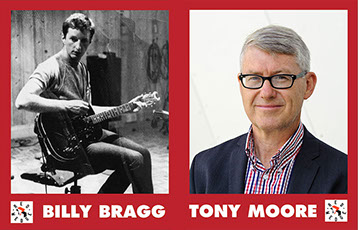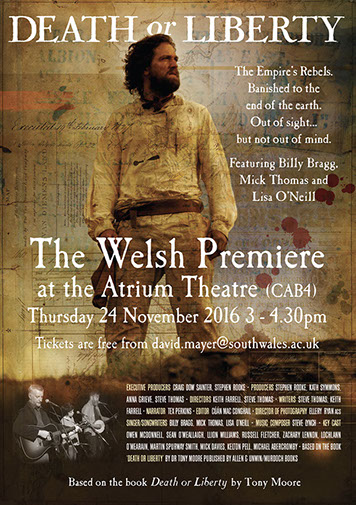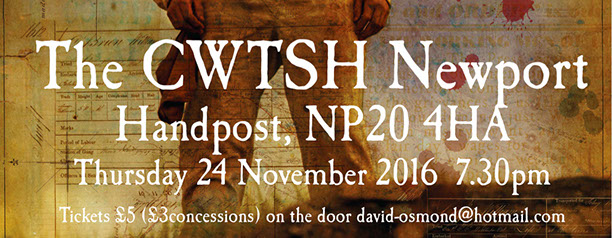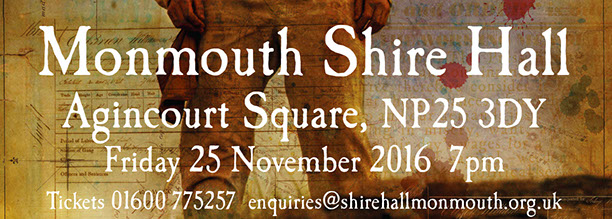





Welsh Premiere "Death or Liberty" at the Atrium Cardiff
An Australian Film with origins in 1980s Cardiff
Rhodri Morgan welcomes Tony back to Wales
Tony Moore from Melbourne, Australia first visited Wales in January 1986 when “volunteering with Red Wedge at the concert in Cardiff. Billy Bragg and Paul Weller’s 'Style Council' featured on stage. I was 24. Met Billy and that’s where the collaboration began. Billy Bragg’s one of the musical directors of ‘Death or Liberty’. And it all started in Cardiff!”


There will also be screenings of the film at the Cwtsh (Newport) and Shire Hall (Monmouth). (For details see below) Tony Moore will be at both to introduce and discuss his film
RHODRI MORGAN (First Minister for Wales 2000-2009) will welcome Tony Moore (Monash University) at the Welsh Premiere of this ground breaking film
Tony Moore, who is Associate Professor (Communications and Media Studies) at Monash University, is certain that although “Most Australians are well aware of their nation’s convict roots, few appreciate that transportation was a common punishment for protest, agitation, rebellion, dissent and riot directed against the British Crown and its representatives”.
There’s no doubt too that British audiences will be shocked by the continuous and relentless use of transportation by the British justice system to suppress political opposition.
In his 80 minute docudrama, TONY MOORE brings together the stories of the political prisoners, who were sent as convicts from all over Britain and its vast Empire to Australia. It’s a movie that transports us to the early days of the penal settlement at Sydney Cove in the late 18th century and spans eight decades of injustice and degradation until transportation stopped in 1868.
Two of the politicos brought ‘to life’ in the film are the south Wales Chartists, John Frost and Zephaniah Williams, found guilty of treason and sentenced with William Jones of Pontypool by hanging, followed by a beheading and quartering of their bodies. Faced by a tumult of protest meetings and petitioning across the country against this ‘barbaric’ punishment, Lord Melbourne and his cabinet took the advice of the Lord Chief Justice that the jury’s verdict was ‘unsafe’. The prospect of a breakdown of public order at the time of Victoria’s marriage to Albert forced the Government’s hand. A royal proclamation was issued commuting their sentence to life transportation. Within a month, the three men were removed from the country aboard the Mandarin in February 1840 arriving at Hobart in Van Diemen’s Land (Tasmania) on June 30th.
It has been calculated that at least 3600 political enemies of the ‘State’ were banished to the penal settlements of southern Australia, Van Diemens Land (Tasmania) and Norfolk Island. With a total of 162,000 transportees, politicos constituted a minority – to be exact, only 1 out of every 45 convicts transported. Although small in number, it has to be recognized that these people (all men?) were drawn from the male cadre of the liberals, democrats, republicans, machine breakers, food rioters, trade unionists, Chartists, radical journalists and the Irish and Canadian rebels. A system designed to remove Britain’s criminals and social misfits proved invaluable in the establishment’s attempts to decapitate the leaderships of opposition movements. But surely, there are likely be some thousands, victims of deprivation and systemic exploitation, who were lumped within the category of ‘common criminals’ and literally were dumped in Australia because the authorities feared their presence in Britain could be turned by revolutionary ‘design’. This might be particularly true of some of the female convicts?
The truth is we do not know, the research has yet to be done. There are many important issues to be explored such as the interface between convicts and free settlers. What was the role played by ex-convicts in the Anti-Transportation League and the creation of representative assemblies? There has been in recent years considerable Tasmanian interest in the political activity of William Cuffey, a tailor, a Chartist and a black man. There is comparable UK research, primarily by Sarah Richards, in the role played in Australia by Catharine Frost, who went to Adelaide in 1853 lobbying to bring her father home. How important were the Irish MPs in the British Parliament and the Irish in Australia in gaining release of not only the Irish rebels but also the Chartists?
It’s therefore timely that Professor Tony Moore’s tour of south Wales (24 & 25 November) includes a symposium at the Gwent Archives to review how a transnational ‘Political Convicts Project’ might involve Wales. He will also be sounding out interested parties in London, Manchester and Dublin.
‘Death or Liberty’ FILM TOURS SOUTH WALES
Welsh Premiere 24 & 25 November 2016
Thursday 24 November 3.00 – 4.30 pm
at The ATRIUM, University of South Wales, CARDIFF CF10 2HA
secure your FREE place(s), apply les.james22@gmail.com
The CWTSH, Newport
NP20 4HA Thursday 24 November 7.30 pm
£5 (£3 concessions) on the door, book your reservations
david-osmond@hotmail.com
Shire Hall, Monmouth
NP25 3DY Friday 25 November 7.00 pm
+44 01600 775257 enquiries@shirehallmonmouth.org.uk
Reception desk open 10.00 – 16.00 hrs (Mon- Sat) £3 advance booking (£4 on the door); Students £2
At all these events, Tony Moore will introduce and discuss his film, and sign copies of his book.
Dr. Tony Moore introduces “Political Convicts Research Project”
at Gwent Archives, Ebbw Vale
Friday 25 November 2.00 – 4.00pm
Free Event: Booking essential via enquiries@gwentarchives.gov.uk
With Les James
author of Render the Chartists Defenceless: John Frost's Voyage with Dr. Mckechnie to Van Diemen's Land in 1840, Three Impostors (2015)
http://www.threeimpostors.co.uk/SHOP-1
The south Wales tour of ‘Death or Liberty’ is sponsored by OUR CHARTIST HERITAGE and CHARTISM Magazine, with the support of The Cwtsh (Newport), Shire Hall (Monmouth) and Gwent Archives
Associate Professor Tony Moore, BA (hons) (Syd); PhD (Syd)
Biographical note:
Tony Moore joined the Communications and Media Studies Programme at Monash University, Melbourne in 2009, following careers in book publishing with Pluto Press and as a programme maker at ABC Television. He completed his doctorate in Australian cultural history at the University of Sydney and writes regularly on communications, history and politics in the press and scholarly publications. Tony maintains close industry links with professionals working in the media and policy sectors.
For his biography, see profiles.arts.monash.edu.au/tony-moore/






